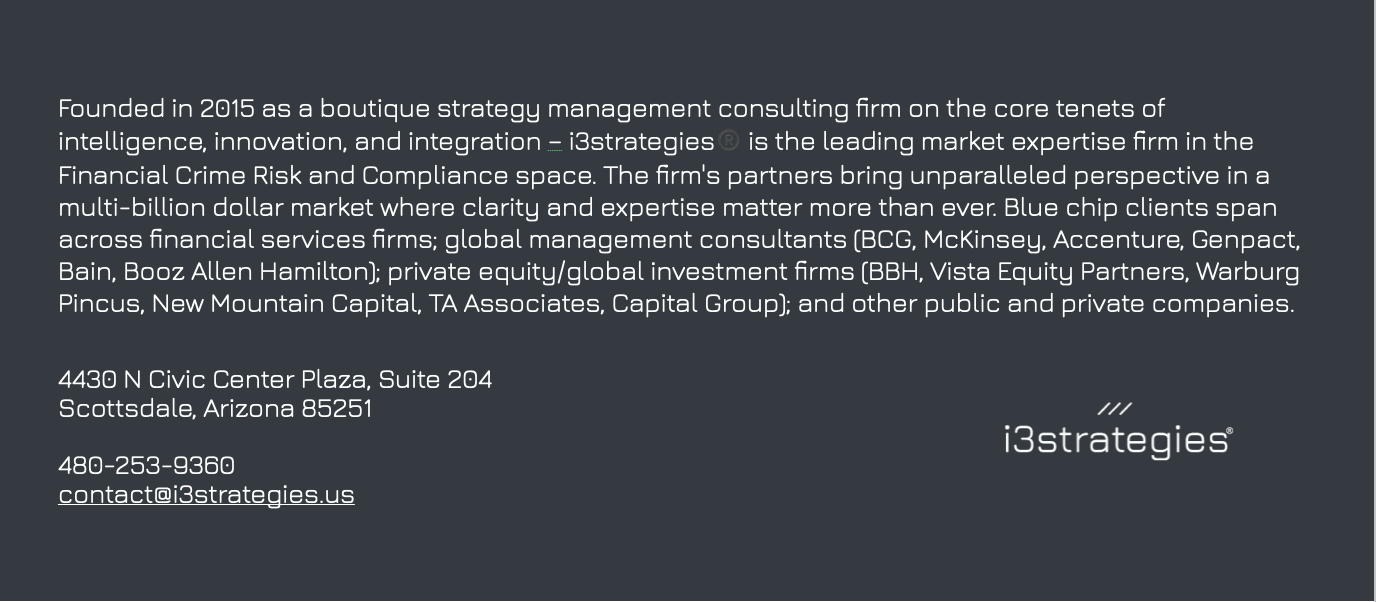FinCrime Modernization is More Than Just Technology

Scottsdale, Arizona, May 31, 2022 – i3strategies®️, a boutique consultancy with unique expertise in the Financial Crime Risk and Compliance space, is pleased to present our latest blog post.
The Anti-Money Laundering Act ("AMLA") of 2020 mandates the government to "modernize anti-money laundering" and "encourage technological innovation." This sparks a flicker of optimism. Could this be the point where we say goodbye to systems and processes that frustrate workers and impede compliance? Perhaps. However, consider that for "modernization" to be successful, it must be thought of more broadly than just new software. New software alone will not fix all Financial Crime Risk and Compliance problems.
No doubt that better technology is a cornerstone of modernization. Yet, only modernizing one corner of the industry will fail to achieve improvements practitioners want, and the government says it's encouraging.
More Than Technology
Everyone agrees today's approaches to fighting financial crime are inefficient, slow, costly, and detect only a tiny fraction of illegal money flows. But, outdated technology is not the only reason for this. Today's Financial Crime Risk and Compliance programs are a jumble of inefficiency and complexity. This is what happens after years of reacting to new regulations and "guidance," implementing "recommendations" to appease auditors and examiners, and adding new software hoping to improve shortcomings of previously purchased software.
Over the past decade, think about how many additional processes, procedures, and work steps were added to everything we do. Is it dozens or hundreds?
The push to modernize creates a unique moment to assess everything a program is doing, not only its technology. There is an opportunity to look at an entire program and evaluate each part - every policy, every procedure, every process, organization structure, software, data, audits, examinations, reporting - everything.
Willingness to Change
Modernization is change. Change is difficult in most situations and more so in a regulated environment. Regulators are unlikely to welcome changes. The status quo's pull is strong. Regardless of inefficiency, cost, and frustration, keeping things the same is easier and feels safer. But, the AMLA 2020 provides an opening.
For the past decade, we've all complained about how inefficient and unproductive much of AML is. The government is giving the industry a chance to do something about it. For those willing to take up the challenge, you can shape the next ten to twenty years of financial crime-fighting. You can help disrupt and detect more drug and human trafficking, political corruption, fraud, and wildlife poaching while also strengthening compliance, passing audits and examinations, and doing so using modern systems and processes that make work enjoyable and fulfilling. To achieve this, begin thinking beyond just new software. Look at everything and ask if it strengthens compliance. If it doesn't, find a better way.

